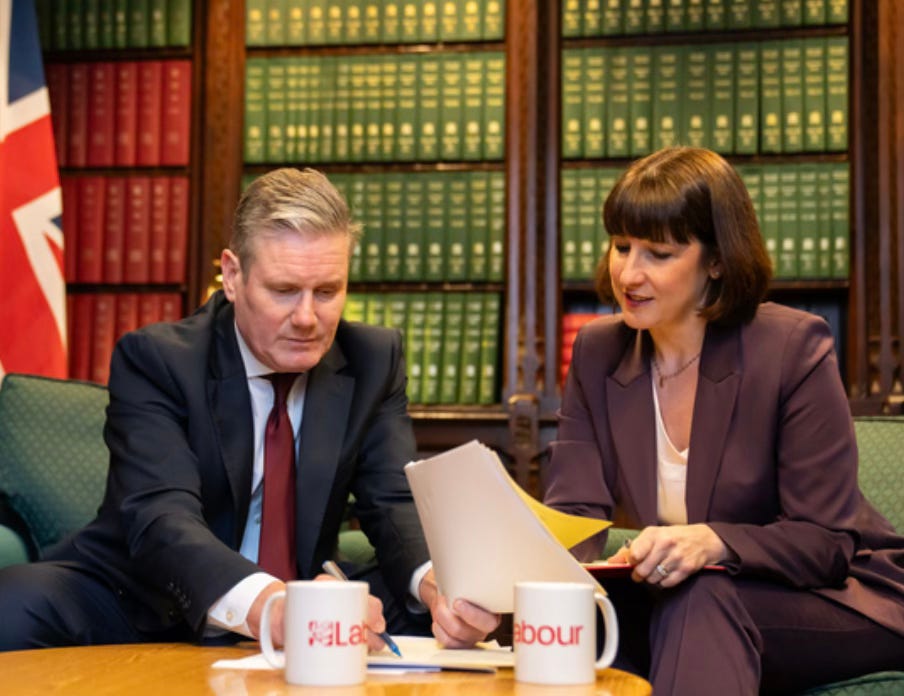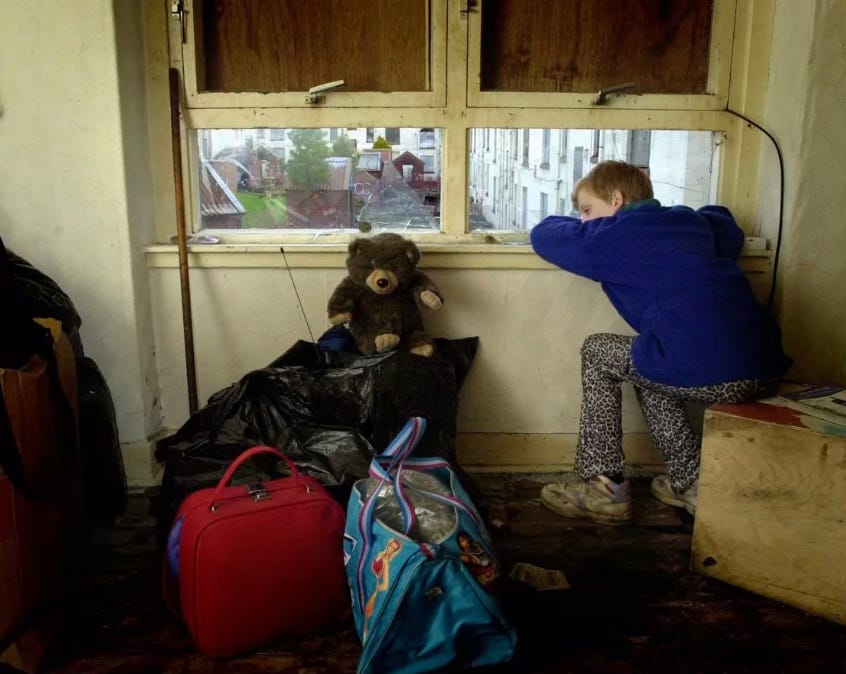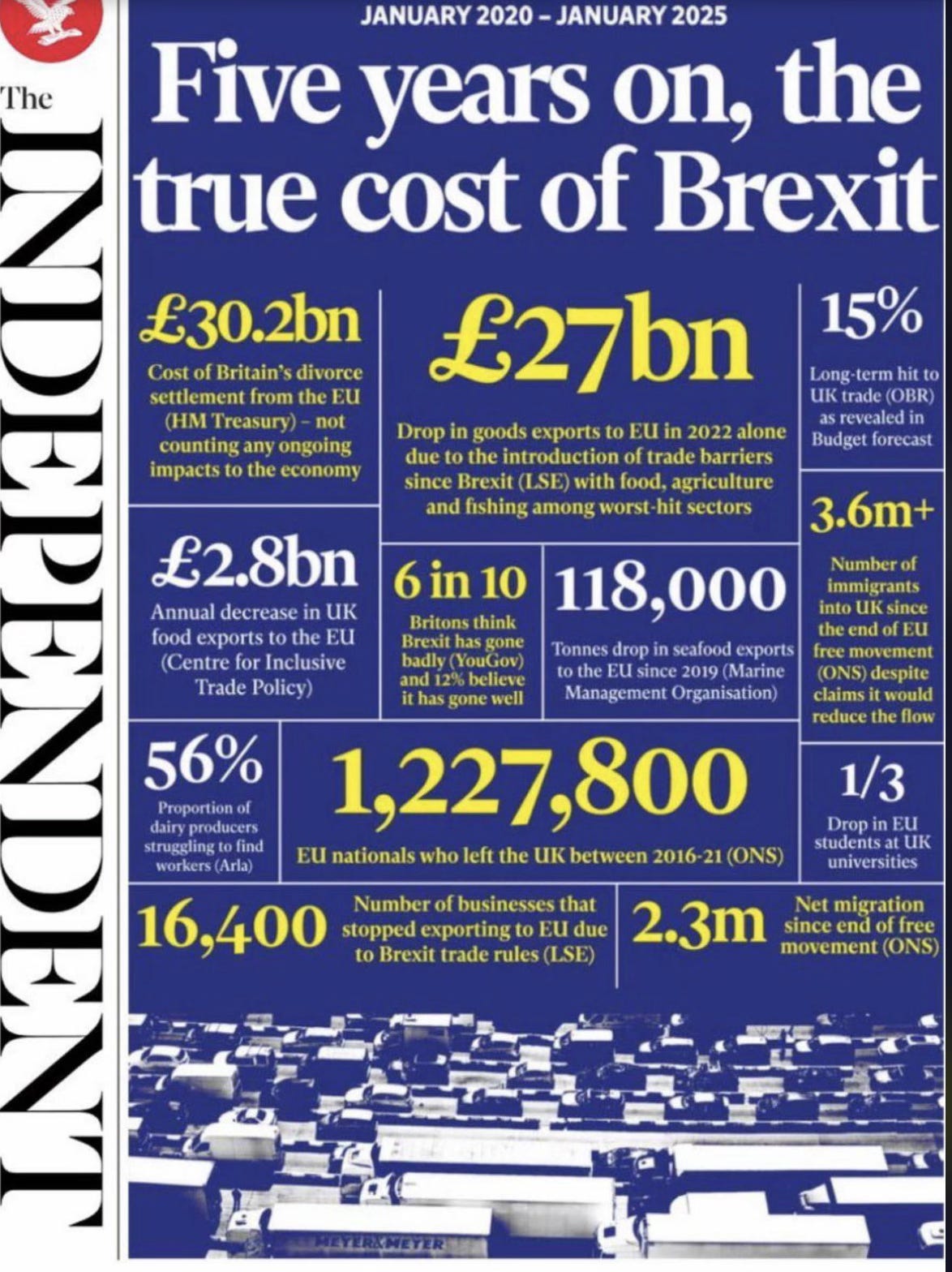
So, this is it. The 'change' we were promised. Labour is in Number 10, yet the stench of decay from the last decade and a half hasn't lifted; it's arguably thickening, now mingling with the acrid fumes of renewed global instability blowing across the Atlantic since January. Forget transformation. Forget hope. What we're witnessing feels sickeningly like continuity: a Labour government seemingly content to administer the slow, managed decline of a nation already brought low by austerity and the monumental, self-inflicted wound of Brexit. Bound by the iron cage of fiscal orthodoxy - rules scarcely different from those that strangled us before (Labour Party, 2024) - and paralysed by a craven refusal to speak the truth about leaving Europe, Starmer's administration offers not renewal, but resignation. It’s like they’re presiding over a national hospice, while the public pays the price in shattered services and stolen futures.
The Austerity Imperative: Blood From Stones, Again
Listen past the soothing Treasury jargon, 'tough choices', 'fiscal headroom,’ and hear the grinding reality: it's the same brutal squeeze, just with a red rosette pinned awkwardly to the bailiff's lapel. Chancellor Reeves mouths the platitudes of 'responsibility' while wielding the axe against services already hacked to the bone over fifteen years. While local councils howl about imminent collapse (Local Government Association warnings), while independent analysts grimly detail the starvation rations facing public services (Institute for Fiscal Studies analysis), the mantra remains fixed: appease the markets, balance the books, crucify the poor.
This is a deliberate political choice, a sickening echo of the failed "dangerous idea" of austerity that Mark Blyth (2013) so damningly exposed. It's a calculation that market 'credibility' - bowing and scraping to the very forces that thrive on inequality - matters more than heating homes, feeding children, or staffing hospitals. The devastating reality is etched in the data that does exist: NHS waiting lists that mock the idea of a functioning health service, obscene levels of child poverty documented before this latest squeeze began - over 14 million people including nearly one in three children trapped below the line in 2022/23 (JRF, 2025) - and queues outside food banks that shame a supposedly civilised nation (Trussell Trust data). This is a brutal, ongoing assault on our social fabric.
Taxing the Wrong People: The Wealth Hoarders Get a Free Pass
And where, in this festival of belt-tightening, is the slightest suggestion that the truly wealthy might shoulder their share? A wealth tax? Meaningful levies on capital gains or inheritance? Ruled out. Too difficult. Too controversial. Labour promised loophole closures (Labour Party, 2024), fiddling at the edges while the grotesque spectacle of wealth concentration accelerates – a dynamic laid bare by Thomas Piketty (2014). Maintaining a 'competitive' environment for corporations apparently eclipses building a society where nurses don't need food banks. It deliberately ignores the vast, undertaxed reservoir of wealth while continuing to squeeze income and consumption. It’s a system designed to protect the powerful, reinforcing the grotesque inequalities that tear us apart. To pretend 'everyone must contribute' while shielding the wealthiest is class war waged by stealth.
Brexit's Long Shadow: The Disaster We Dare Not Name
And looming over everything, casting its deathly pall, is Brexit. The single greatest act of economic self-harm in modern British history yet treated by this Labour government with the same terrified silence as its predecessors. The damage isn't abstract; it's real, documented in cold, hard figures showing hammered trade, choked investment, and lowered growth potential (e.g., Cambridge Econometrics, 2024). Businesses scream about the crippling red tape, the lost markets, the sheer, grinding cost of this ideological vanity project. Yet Labour's 'plan'? Tinkering at the edges of a fundamentally broken deal. Minor tweaks. Pathetic overtures. No mention of the Customs Union, let alone the Single Market: the only measures that could genuinely staunch the bleeding. It's a betrayal of national interest, condemning Britain to limp along in the slow lane.
Starmer's Brexit Bind: Paralysed by Fear, Drowning in Cowardice
Let's focus on the festering wound at the heart of Britain's decline: Brexit, and the Labour leadership's gutless response steeped in fear, a betrayal dressed up as pragmatism. We're told revisiting the disaster - even to stem the bleeding by rejoining the Customs Union - is impossible. Why? The official excuses revolve around respecting the referendum or avoiding division. The reality? Terrified whispers about the 'Red Wall', focus groups weaponized against change, and a pathetic deference to the billionaire media barons who cheer led this national catastrophe. A supposed party of change held hostage by electoral ghosts and press bullying, utterly refusing to lead or speak plain truths about the economic devastation documented by countless analyses (e.g., Cambridge Econometrics, 2024).
This isn't 'forensic politics'; it is utter cowardice masquerading as strategy. It’s an insult to the intelligence of the British people, assuming they can’t handle the reality that Brexit has been, and continues to be, an unmitigated disaster shrinking our economy and diminishing our standing. It’s a failure to make the argument, to counter the lies still peddled daily, to offer a vision beyond just managing the slow puncture. Where is the leadership? Where is the courage to say: "Yes, this has failed, and we need to fix it"? Apparently, it died somewhere on the long road back to perceived electability.
The result is a government locked in a strategic doom-loop. In one breath, Starmer speaks of needing Europe "shoulder to shoulder" against the terrifying instability amplified by Trump's Washington and Putin's aggression (Government Statements, 2025). In the next, he defends the very economic barriers - the red tape, the trade friction, the regulatory divergence - that deliberately sabotage that vital partnership. It’s like trying to fight a war while refusing to properly supply your closest allies. How can you talk seriously about defence supply chains, energy security, or intelligence cooperation when you maintain self-imposed obstacles to the seamless economic integration that underpins true alliances? It’s dangerous strategic idiocy, sacrificing national security interests on the altar of domestic political timidity.
And what does this deliberate, enforced silence cost us? Billions in lost trade and investment, and indeed, something more profound. It actively corrodes our political discourse, preventing an honest national conversation about our future. It treats the public like children, incapable of reassessing a decision based on overwhelming evidence. This refusal to engage, this shutting down of debate, feeds the very cynicism and disillusionment that weakens democracy from within; the collapsing trust and sense of powerlessness already recorded before this government even began (POST, 2024). How can people trust a political class that refuses to name the elephant trampling through the room? It creates a vacuum where facts don't matter, where grievance festers, and where, as history chillingly warns, demagogues find fertile ground (Levitsky & Ziblatt, 2018). The health of our democracy itself is being damaged by this evasion.
Make no mistake: this terrified stasis cannot hold indefinitely. The sheer weight of economic reality will bear down. Businesses will scream louder. The public, suffering the consequences, will eventually see through the charade. Pressure from within Labour's own ranks (those not mesmerised by focus groups) will surely mount. When the inevitable U-turn comes, perhaps a desperate half-measure years too late, it will merely expose the hollowness of the current stance, the wasted time, the lack of principle. This paralysis is a symptom of a deeper political malaise, a catastrophic failure of nerve from a leadership seemingly unwilling to offer genuine opposition to the forces driving Britain's relentless decline.
Global Turbulence, Domestic Sacrifice: Convenient Excuses
Now, add the volatile reality show unfolding in Washington since January. Trump 2.0 injects fresh poison into an already fragile global system: talk of tariffs, threats to NATO, the trashing of norms. Increased defence spending becomes an unquestionable necessity, crowding out desperate social needs. For the UK government, this turbulence is incredibly convenient. Every global shock becomes another reason why living standards must fall, why services must be cut, why the Brexit disaster, which leaves us more exposed, cannot be revisited. It’s a narrative designed to induce helpless resignation, obscuring how our own political choices - austerity, Brexit - amplify our vulnerability. We are told to sacrifice, while the underlying causes of our national malaise are deliberately ignored.
The Human Cost and the Erosion of Trust: Ground Zero for Demagogues
Look at the real consequences. Poverty isn't just a statistic; it's millions struggling – over 14 million people, including nearly one in three children, trapped below the line even in 2022/23 (JRF, 2025). It's deepening destitution, widening health inequalities, regions left to rot, lives stunted. But the damage isn't just economic. This potent cocktail of enduring hardship and perceived political betrayal is dangerously corrosive. It eats away at democratic consent, breeding deep cynicism about whether the system itself can deliver meaningful change. When mainstream parties seem unable or unwilling to confront fundamental problems, such as the crippling legacy of Brexit, entrenched inequality, they create a vacuum of hope. History warns what rushes into such voids (Levitsky & Ziblatt, 2018): simplistic, divisive narratives offering easy scapegoats, often targeting democratic norms themselves. Trust in politics was already plumbing horrifying depths (POST, 2024). Labour's cautious strategy looks less like responsibility and more like dangerous complacency. By failing to offer a compelling vision, they risk fertilising the ground upon which anti-democratic forces flourish.
Conclusion
So where does this leave us, adrift in 2025? Staring into the face of a government managing Britain's decline with chilling competence yet utterly failing to challenge its course. Labour, handed power amidst crisis, seems trapped by the very orthodoxies, both fiscal and political, that created the mess. Austerity continues its grim work, wealth remains untouchable, the Brexit catastrophe festers unaddressed, and global chaos provides a convenient smokescreen for inaction. This is a recipe for national despair and, potentially, democratic decay. The relentless erosion of public services, combined with the cynical manipulation of political discourse and the deliberate avoidance of hard truths, breeds the exact conditions of disillusionment and division that history tells us are so dangerous (Levitsky & Ziblatt, 2018). As faith in mainstream solutions evaporates (POST, 2024), the space for radical, potentially destructive alternatives widens. Recognising this trajectory, understanding the forces at play, including the known tactics for undermining democratic resilience, is essential vigilance. The endpoint of managed decline and political cowardice doesn't have to be inevitable collapse, but resisting it demands a clarity, honesty, and courage currently missing from the heart of British power. It requires rejecting the narrative of helplessness and demanding accountability. The question isn't just 'how much more can this country take?', but 'when do we refuse to take it anymore?'
Notes From Plague Island is quickly becoming a full-time venture. We want to grow our output and dedicate more time to writing, but it takes support! If you enjoy our work and can help, please support us on ‘Buy Me a Coffee.’ Every coffee helps, in many ways. Thank-you - we appreciate you!
https://buymeacoffee.com/notesfromplagueisland
References
Advani, A., Chamberlain, E. and Summers, A. (eds.) (2020). A Wealth Tax for the UK. Warwick: The Wealth Tax Commission.
Blyth, M. (2013). Austerity: The History of a Dangerous Idea. Oxford: Oxford University Press.
Cambridge Econometrics. (2024). London's Economy After Brexit: Impacts and Implications. January 2024. Available at: https://www.camecon.com/wp-content/uploads/2024/01/Londons-economy-after-brexit-Impact-and-implications.pdf (Accessed 27 March 2025)
Joseph Rowntree Foundation (JRF). (2025). UK Poverty 2025: The essential guide to understanding poverty in the UK. Published 29 January 2025. Available at: https://www.jrf.org.uk/uk-poverty-2025-the-essential-guide-to-understanding-poverty-in-the-uk (Accessed 27 March 2025)
Labour Party. (2024). General Election Manifesto 2024. Available at: https://labour.org.uk/updates/stories/labour-manifesto-2024-sign-up/ (Accessed 27 March 2024)
Levitsky, S. and Ziblatt, D. (2018). How democracies die. New York: Crown.
Norris, P. (ed.) (1999). Critical Citizens: Global Support for Democratic Government. Oxford: Oxford University Press.
Parliamentary Office of Science and Technology (POST). (2024). Democratic engagement and trust in parliament. POSTnote 735, October 2024. Available at: https://post.parliament.uk/democratic-engagement-and-trust-in-parliament/
Piketty, T. (2014). Capital in the twenty-first century. Cambridge, MA: The Belknap Press of Harvard University Press.






Where are all those great trade deals? Singapore on the Thames indeed. It should be clear that making an equitable trade deal with the US is totally a no go.